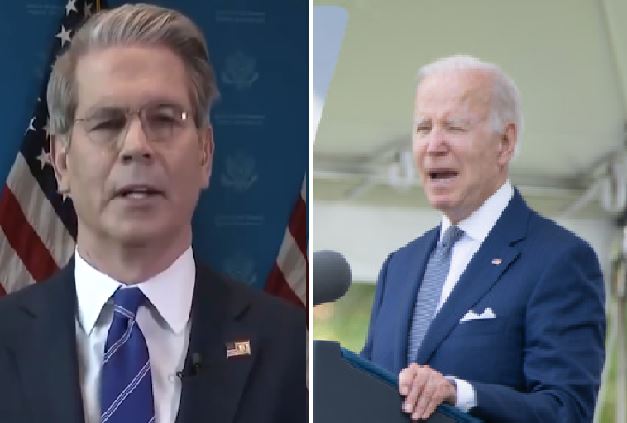Bessent Drops Bombshell: China Blew Off U.S. Trade Obligations When Biden Took Office
U.S. Treasury Secretary Scott Bessent confirmed Monday what many already suspected: the Chinese Communist Party abandoned its trade commitments with the United States the moment Joe Biden stepped into the Oval Office. Speaking to reporters following marathon trade negotiations in Geneva, Bessent made it clear—President Trump’s return to economic leadership is forcing China back to the table.
After an eight-hour summit with Chinese officials this weekend, Bessent announced a new mutual agreement to reduce tariffs. Starting May 14, both countries will implement 10% reciprocal tariffs on goods—a dramatic rollback from the 34% level previously in place under emergency tariff frameworks.
China Saw Weakness Under Biden, Says Bessent
Bessent did not mince words. The failure of the Biden administration to enforce the U.S.-China trade agreement signed in 2020 under President Trump allowed China to flout its responsibilities without consequence.
“In January 2020, President Trump produced a template,” Bessent said. “We had an excellent trade agreement with China, and the Biden administration chose not to enforce it.”
“The Chinese delegation basically told us that once President Biden came into office, they just ignored their obligations.”
The admission from Chinese officials underscores what critics have long alleged: Biden’s lack of economic leverage has encouraged adversaries to backpedal on agreements and act with impunity.
Deal Includes Cooperation on Fentanyl Crackdown
In a significant breakthrough, China has now agreed to assist the U.S. in combatting the production and trafficking of fentanyl and chemical precursors used by drug cartels across North America. The announcement marks the first time China has publicly committed to enforcement cooperation on narcotics since Trump left office.
Bessent said this was a critical inclusion in the deal.
“We’re going to hold them to this. The flow of fentanyl from China has devastated American communities. This is no longer negotiable.”
More Than Tariffs: Negotiations Cover Currency, Labor, and Subsidies
While the headline focus is on tariff parity, Bessent emphasized that the talks go much deeper—addressing currency manipulation, non-tariff barriers, and illicit labor subsidies. These issues were foundational to Trump’s original trade strategy and are now reemerging as focal points in a new American trade doctrine.
“The negotiations are a combination of tariffs, non-tariff trade barriers, currency manipulation, and subsidies of labor and capital,” Bessent explained.
He noted the importance of establishing trust, especially after China’s disregard for previous commitments. “Their agreements should be honored no matter who is leading America,” he said.
Trump’s Pressure Works — Again
This new agreement signals that President Trump’s hardline, results-driven trade strategy is not only back—it’s working. China’s decision to meet with U.S. officials and recommit to structured trade terms is a vindication of Trump’s belief that leverage, not diplomacy for its own sake, is what brings adversaries to heel.
Looking Ahead
With the May 14 deadline approaching, the world will be watching whether China honors its word this time. Trump has already warned that failure to comply will result in the automatic reinstatement of higher tariffs, with penalties that escalate.
“You don’t make deals to get ignored,” one official close to the talks said. “We’re back to playing hardball—and China knows it.”
This is economic diplomacy with teeth—and under President Trump’s restored leadership, America is once again in control of the table.

